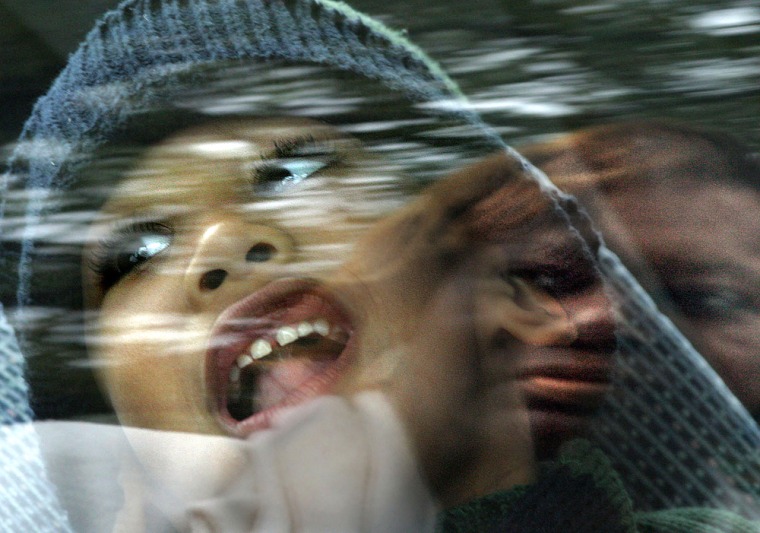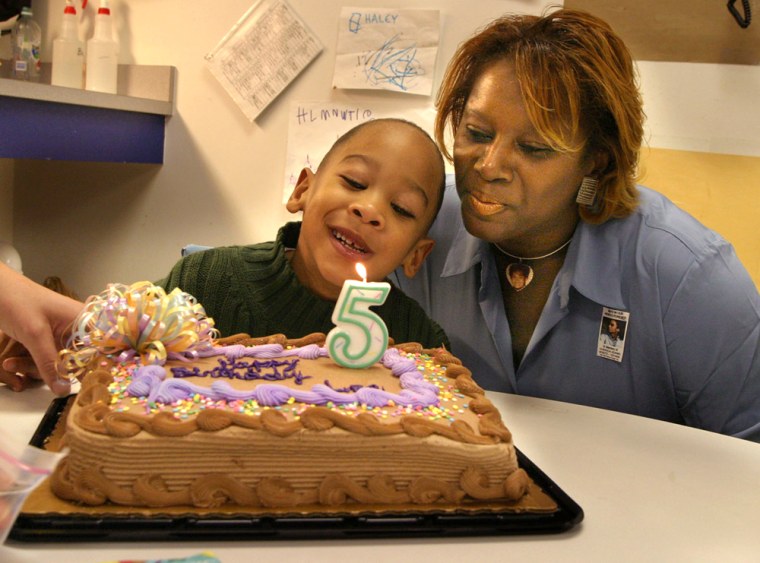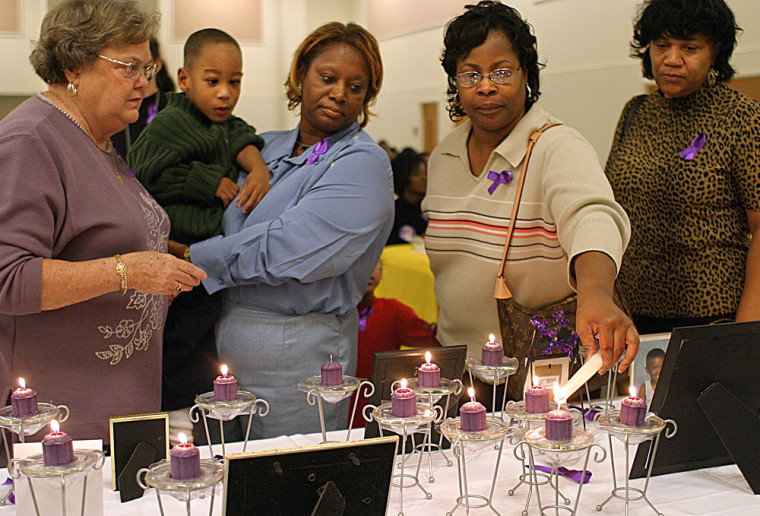Chancellor Lee Adams sat on his mother's grave, gazing at the bronze marker that bore her name. It was his birthday, and he had just turned 5, which was exactly how many years it had been since the shooting that took her life.
With one arm around his back, his grandmother gestured at a lush bouquet they had brought. "Look at your mommy's flowers," she said. Chancellor smiled.
Five years earlier, he was delivered from his mortally wounded mother in an emergency Caesarean section — 10 weeks premature and blue from lack of oxygen. The trauma left him with cerebral palsy. He wears braces on his legs, needs help to walk and speaks only a handful of words.
"Happy birthday to you, happy birthday to you," his grandmother sang to him at the graveside. "Happy birthday, dear Chancellor. . . ."
It has been like this, death and birth inextricably bound, since his famous father arranged the killing of his mother. Rae Carruth was an all-American wide receiver, a $3.7 million, first-round draft pick for the Carolina Panthers. Now he is in prison, convicted of conspiracy in the 1999 killing of Cherica Adams.
Chancellor's grandmother showed him the big purple balloons they had brought for the occasion — each tagged with a small photo of Cherica and a verse from the Bible. One by one, they released the balloons into the cloudy November sky.
"I love you, Mommy," his grandmother offered.
Chancellor broke into a wide smile.
"Yeaaaaah," he said.
'It was a miracle'
No one knows exactly how many children like Chancellor are rescued from the wombs of their dying mothers.
But it happened in 2000 when Yolanda Coles, 34, was eight months pregnant and fatally shot outside her Richmond apartment. It happened in 2002 when Tara Chambers, 29, was shot in her Concord, N.C., home and in 1998 when Sherry Culp, 36, was shot outside her workplace in Springfield.
Sometimes these children do not survive. Doctors rush to save them, and families pray, but they die because the trauma has been too much. Culp's daughter lived two days. Chambers's daughter held on for 33 days. "They tried everything they could," recalled grandmother Johnsie Tucker, "but we had to give up."
In other cases, children make it but face debilitating injuries. In Portsmouth, Va., Breonna McRae survived her pregnant mother's shooting in 2002 but suffered brain damage from lack of oxygen. She still does not walk, talk or swallow. She has had pneumonia four times, falling so ill her grandmother LouAnne Sweet has wondered, "Is she really going to make it?" Breonna is doing better lately, the family says, but everything is one day at a time.
Then, against the odds, there are such children as Ter-ron Marquise Oglesby.
His mother, Damita Oglesby, 29, was severely wounded in a stabbing in Atlanta when she was four months pregnant. After three months in a coma, she went into labor. Ter-ron was delivered without complications, a healthy baby boy.
"It was a miracle," said his grandmother Carolyn Oglesby, who recalled that tears ran down her daughter's face when the baby was placed on her chest in the hospital, even though she was still in a coma. Seven weeks after Ter-ron's birth, Damita Oglesby died.
Lasting legacy of unimaginable consequences
A Washington Post examination of maternal homicides — which used death-record data to document more than 1,367 killings of pregnant women and postpartum mothers nationwide — found that one lasting legacy of these homicides is a population of children left to face almost unimaginable consequences. Their mothers are gone. Many fathers are in prison or dead. Their extended families are deep in grief and often reeling financially.
Babies are born in this moment of horror. More often, there are older siblings. In Virginia alone, 68 children were left behind after the killing of their pregnant or postpartum mothers since 1990, The Post's analysis shows. Nationally, in one year — 2002 — there were at least an additional 62 ff these children.
Some of them struggle not just with loss but also with memory. They witnessed their mother's death, or heard the crime unfold, or awoke in the morning to discover her body.
Sally Blakely said her 5-year-old grandson had seen enough violence in the house before his mother's killing to imagine it. Erskala Blakely, 22, of Richmond was postpartum with twins and trying to leave the abusive father of her four children when he strangled her.
For weeks, the 5-year-old carried his mother's picture around the house, dwelling on how he might have saved her. His grandmother recalled: "I had to tell him, 'Baby, you were only 5. There was nothing you could have done.' "
The hurt of it all is too intense to ever go away, said Georgia Simmons. Now 62, she has been raising her grandson for nearly 14 years, since the day her pregnant daughter was shot in Richmond and her baby survived an emergency Caesarean section. Christmases are still hard — she can hardly bear to hear the carols that her daughter loved — but January is difficult, too: the anniversary of Deborah Randall's slaying.
"Every death day of hers is a birthday of his," she said. "It hits my gut very deep."
'I've been shot'
Back in 1999, Chancellor Lee Adams might have seemed bound for a life of privilege and possibility. His father had been widely seen as the future of the Carolina franchise, after distinguishing himself as a leading National Football League rookie. Chancellor's mother was a onetime model who attended college for two years, then returned to Charlotte to try her hand in real estate and business.
The couple met at a summer pool party. Cherica Adams had socialized with other athletes, but when she met Carruth, she called her mother, Saundra Adams, and said, "Mom, I've just met my soul mate." That night, she brought him home to meet her father.

Their relationship was off and on, however. Cherica Adams went to Atlanta for a time. Carruth had many other girlfriends. In spring 1999, Adams found out she was pregnant — and both of them were surprised. Adams took eight home-pregnancy tests before she was convinced, her mother said.
Carruth seemed happy at first, Adams told her mother, but then he asked her to get an abortion. Adams said no.
Once pregnant, she grew to like the idea — playing tapes of Mozart for her fetus, drinking high-protein smoothies and shopping until she acquired a full baby wardrobe from birth to toddler sizes. "She wanted this to be the perfect baby," recalled her mother. "She was forever rubbing her belly and showing us."
The couple's relationship was rocky through much of her pregnancy. Adams "didn't want to just be Number 1 but the only one," her mother said. For a time, they barely talked. Carruth changed his phone number, then took Adams to task for not calling, her mother said. "He kept making and breaking dates," she said. "He was Dr. Jekyll and Mr. Hyde."
At some point, Cherica Adams made it clear she would be seeking child support from Carruth. The prosecutor argued that Carruth was deeply opposed to supporting the child of a woman he was no longer with.
In mid-November 1999, Carruth called Adams to say he wanted to make things right, her mother said. He led her to believe that they were going to be a family. He went to a Lamaze class. "He could've changed," Adams told her mother hopefully.
"She wanted so much to be a couple, and I think it was because I was a single parent," Saundra Adams said. "She really wanted to be married and be a family."
On a Monday in November, Carruth called and asked Cherica for a "real date" to a movie — "The Bone Collector."
After the movie, Carruth and Adams were in separate cars, heading back toward Adams's apartment. According to prosecutors, Carruth led her down a dark road, where he slowed or stopped his SUV. With Adams blocked in, a car with three men pulled alongside her BMW 325 and fired through her window.
Shot four times and bleeding, Adams called 911 on her cell phone "I've been shot," she said.
"You've been shot?" a 911 operator asked.
". . . I'm eight months pregnant," she said.
". . . How'd this happen?" a 911 medic inquired.
"I was following my baby's daddy, Rae Carruth, the football player."
"So you think he did it?" the medic asked.
"He slowed down and a car pulled up beside me."
"And then shot at you?" the medic asked.
"Yes."
Police rushed to the scene. Still conscious, she again told them what had happened. At the hospital, doctors worked to save her life and delivered her baby — Chancellor Lee — in an emergency C-section. The bullet had missed the baby by an inch.
Cherica, 24, died after 28 days in the hospital.
It was about six months later that a neurologist showed Saundra Adams scans of Chancellor's brain. The damage was widespread, she recalled. "They were painting a very bleak picture of his development. They made it sound like he would never be able to walk or talk."
Different triumphs
Five years after his mother was shot, Chancellor Adams sat with eight classmates and their teachers in a bright classroom with shapes and numbers and letters on the walls. A large chocolate birthday cake sat before him, his grandmother nearby.
One boy asked about a small photo pinned to Chancellor's brand-new moss green sweater.
"That's his mommy," his grandmother said.
"She died," the classmate said, knowingly.
Soon the cake was aglow with a large candle shaped like a 5, and the singing started and Chancellor himself was aglow, listening. When everyone clapped, Chancellor clapped with them.
The little boy asked about the photo again.
"How did his mother die?"
Chancellor's grandmother paused, then said: "His mother got shot with a gun. Somebody was very bad."
This is a fact of Chancellor's life.

It is why he has cerebral palsy, why his legs need braces and why his triumphs are different from the average 5-year-old's. Chancellor can pull himself up from sitting to standing. He can stand on his own for a count of 20.
He has learned about 12 words — including "good," which he uses eagerly when someone asks him, "How are you?"
He has also learned how to raise his hands above his head and sway in praise, which he does while sitting in his grandmother's lap at church and in his car seat when the radio is on and his grandmother is driving.
At school, he has learned to use his walker so well that he can run across the playground with it moving alongside him — which he did on his birthday, leaving his grandmother behind.
"Good gracious!" she said. Chancellor beamed.
Adams said the medical experts believe cerebral palsy is not something that can be "cured," but her Christian faith tells her something else. "We believe he's on the road to a full recovery," she said.
Chancellor and his grandmother — the "dream team," she calls them — live in a subdivision in Charlotte, in a house with thick carpeting and framed photographs and a living room where Chancellor's playthings are easy to reach: building blocks, board books, a fire engine, a basketball game, an oversize Elmo.
When Cherica Adams died, Carruth fled the state rather than turn himself in and face murder charges. Authorities caught up with him in Tennessee — hiding in the trunk of a car. In the end, he was convicted on charges of conspiracy to commit murder, shooting into an occupied car and using a gun to try to kill an unborn child. He was acquitted of first-degree murder.
After he was sentenced to nearly 19 years in prison, he told CNN/Sports Illustrated in an interview that he had not been involved. "I feel guilty about none of it," he said. He said that his relationship with Adams had been overstated and that he did not know her last name until Lamaze class. "We were never boyfriend and girlfriend. . . . We slept together."
His attorney, David Rudolf, recently filed another appeal on Carruth's behalf. Rudolf maintains that Carruth is innocent. "He was found not guilty of the murder," Rudolf said in an interview. "He is not guilty of the conspiracy. He had no intention of hurting Cherica Adams." About Chancellor, the attorney said: "Clearly he feels terrible about how Chancellor is. What human being wouldn't be?" He added, "You look at Chancellor and you see Rae."
Just a year ago, Saundra Adams won a judgment of nearly $5.8 million in a civil suit she had filed against Carruth and the three other men convicted in the case. The award came after Carruth decided not to contest the suit, but it may be mostly symbolic because Carruth and the others have no money that can be found, Adams said.
For Chancellor's sake and her own, and in keeping with her Christian beliefs, she said she has forgiven Carruth. "I'm raising his son, and I can't hold on to hateful feelings for him and raise his son," she said. Still, she added: "Justice needs to be served and is being served. I hold him accountable."
'Bittersweet day'
Adams stayed home with Chancellor for his first couple of years but is back at work now, supporting herself and her grandson — "a challenge," she said. It helps that a close friend, Judy Williams, helps care for Chancellor when he is not in school. Williams is a founder of Mothers of Murdered Offspring — in which Adams has become active.
Chancellor's birthday fell on the organization's annual Thanksgiving fellowship dinner and night of remembrance. So the birthday that started at the cemetery ended at a church hall in downtown Charlotte, where, one by one, grieving families lighted a candle and spoke a few words about their slain relatives.
When it was her turn, Adams introduced Chancellor. "Today is a bittersweet day for us," she said, "because it is five years ago today that my daughter was gunned down and today is also his birthday, his fifth birthday."
She set her lighted candle beside a photograph of her daughter.
Just before the evening was over, Williams took the podium to talk about Chancellor. She asked the boy and his family to come forward. Through Chancellor, she said, "I've learned that there is a God up above, and He determines who lives and who doesn't."
The applause was loud.
Then, for one last time on his fifth birthday, Chancellor listened to the sounds of "Happy Birthday," this time delivered by a crowd of 200. When it ended, his grandmother asked Chancellor in a voice that the whole room could hear: "How are you?"
Chancellor spoke proudly.
"Good," he said.
